Nuts have long been celebrated for their delicious taste and crunchy texture, but they also pack a powerful nutritional punch. These small yet mighty snacks are not only versatile in cooking and baking but are also loaded with essential nutrients that can significantly contribute to your overall well-being. Including a variety of nuts in your diet can be a smart move towards better health. In this article, we will explore the top nine nuts to consider adding to your daily menu, starting with some of the most popular ones like pistachios, walnuts, almonds, pecans, Brazil nuts, hazelnuts, and peanuts.
Jump to:
The Healthiest Nuts To Add To Your Diet
Here’s a list of the top seven of the healthiest types of nuts to make sure to add to your healthy diet:
Pistachios
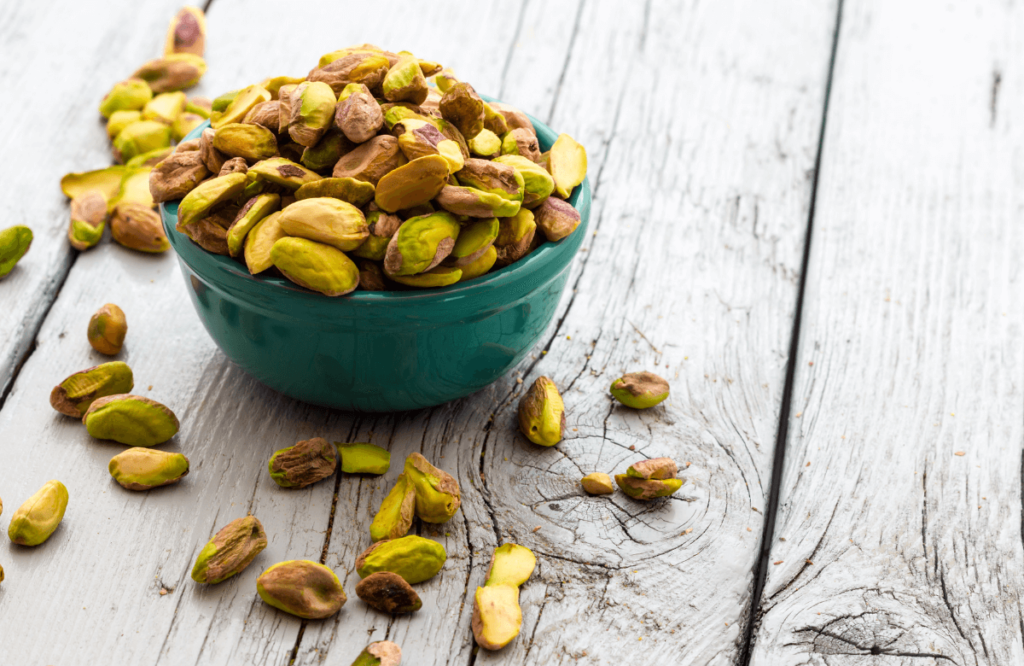
Pistachios are not only a delight to eat but also offer numerous health benefits. A good source of protein and rich in fiber, vitamin B6, and healthy fats, these green-hued nuts are known for their heart-friendly properties. They contain antioxidants, such as lutein and zeaxanthin, which are essential for maintaining eye health. Pistachios may also aid in weight management by promoting feelings of fullness and curbing overeating.
Walnuts
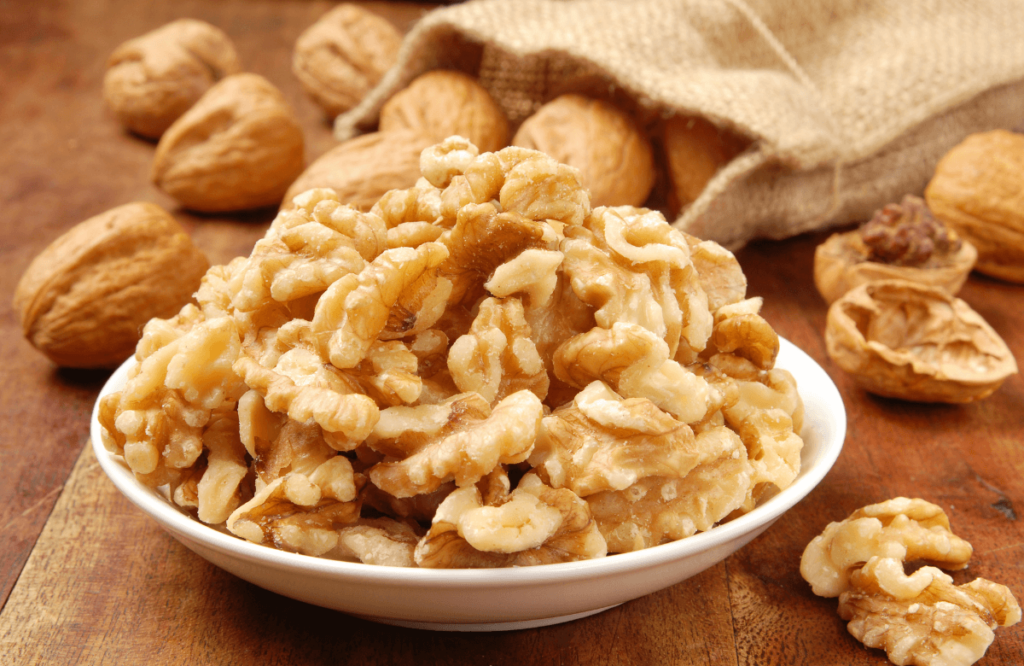
Walnuts are often referred to as the “brain food” due to their uncanny resemblance to the human brain and the remarkable benefits they offer for brain health. Packed with omega-3 fatty acids, antioxidants, and vitamin E, walnuts can improve cognitive function and support heart health. Studies suggest that regular consumption of walnuts may reduce inflammation and lower the risk of chronic diseases like heart disease and type 2 diabetes.
Almonds
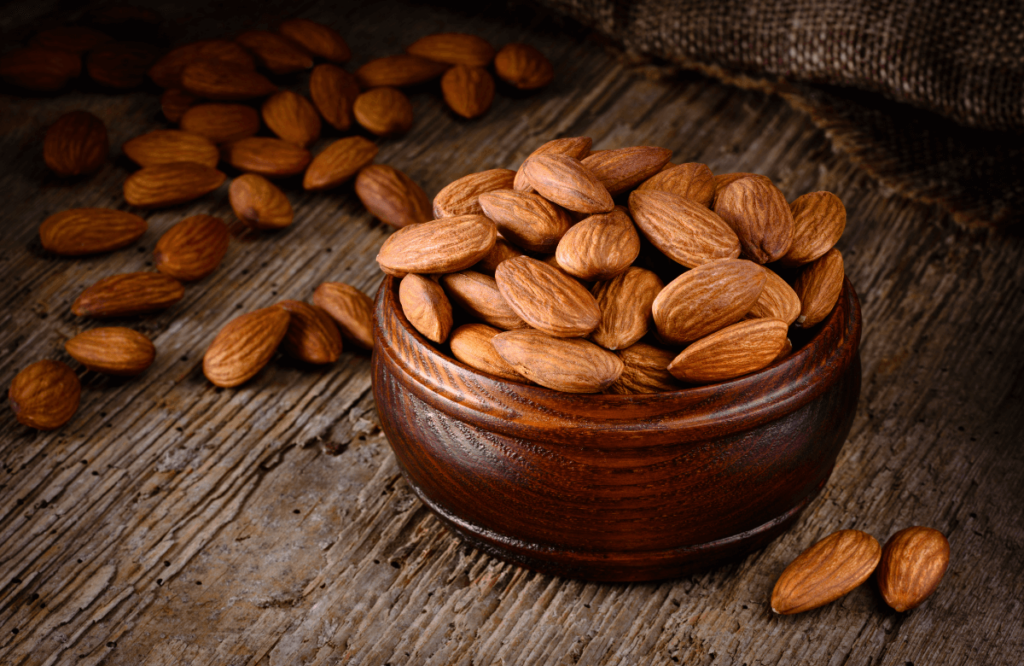
Almonds are among the most versatile nuts, consumed in various forms, including whole, chopped, or ground into almond flour. They are a fantastic source of vitamin E, magnesium, and calcium, all of which contribute to bone health. Additionally, almond consumption has been linked to lower cholesterol levels and improved heart health. These nuts are also known for their role in supporting healthy skin and hair due to their high biotin content. Though, be very careful about store product almond milk as it can have too many “additives” and can be less beneficial than a handful of almonds.
Pecans

Pecans have a unique buttery flavor that compliments both sweet and savory dishes. Rich in monounsaturated fats, pecans can help maintain healthy cholesterol levels and reduce the risk of cardiovascular disease. They also provide essential minerals like zinc and manganese, which are crucial for immune function and bone health, making them an extremely nutritious food.
Brazil nuts
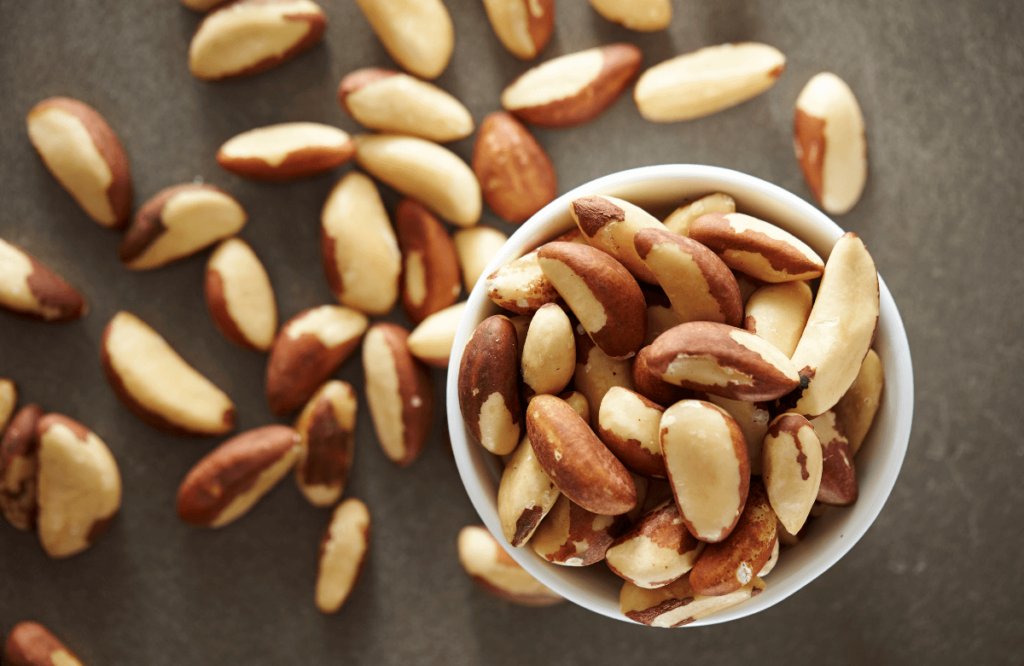
Brazil nuts are a standout when it comes to selenium content, an essential mineral that acts as an antioxidant, helping to protect the body from oxidative stress. Just a few Brazil nuts a day can meet your selenium requirements. This mineral plays a crucial role in supporting thyroid function, boosting the immune system, and promoting overall well-being.
Hazelnuts
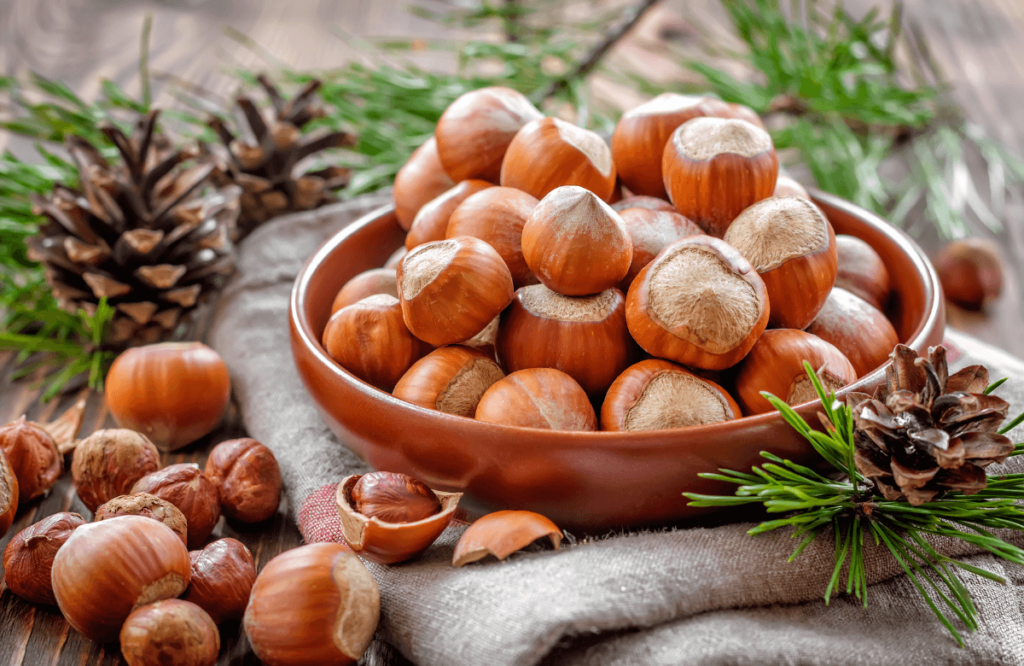
Hazelnuts, also known as filberts, boast a rich, sweet flavor, making them a popular ingredient in many confections and baked goods. These nuts are a good source of vitamin E, which protects the body’s cells from damage caused by free radicals. Hazelnuts are also rich in folate, which is essential during pregnancy for proper fetal development. They’re also the best source of fiber in the form of a nut.
Peanuts
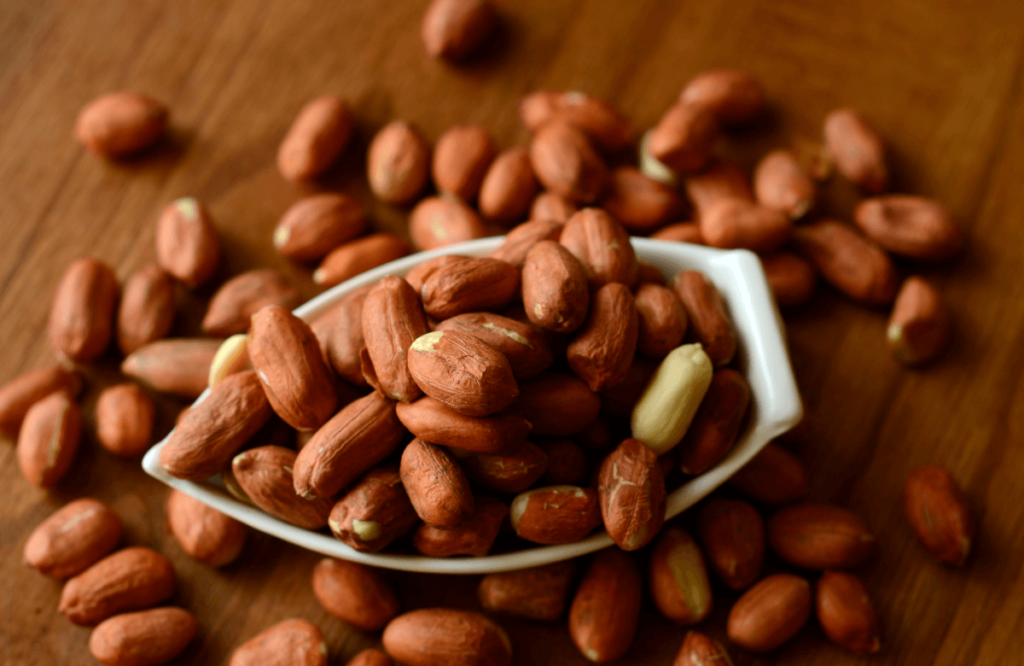
Peanuts are technically legumes, but they are often included in the category of nuts due to their similar nutrient profile and culinary uses. An excellent source of plant-based protein, peanuts offer a range of health benefits. They are rich in monounsaturated fats, which promote heart health, and contain resveratrol, an antioxidant that may have anti-aging effects.
It’s essential to opt for raw or dry-roasted nuts without added salt or sugar to maximize their health benefits. Additionally, if you have allergies or specific health conditions, consult with a healthcare professional before incorporating new nuts into your diet.
Health Benefits Of Nuts
Nuts are not only delicious and versatile, but they also offer a wide array of health benefits including ones like decreasing the risk of heart disease. Incorporating nuts into your diet can provide numerous nutrients and contribute to improved overall well-being. Here are some of the significant health benefits of nuts:
Heart Health
Many nuts, including almonds, walnuts, and pistachios, are rich in monounsaturated and polyunsaturated fats. These healthy fats can help lower LDL cholesterol (the “bad” cholesterol) levels and increase HDL cholesterol (the “good” cholesterol) levels, which can help decrease cardiovascular disease mortality. By promoting a healthier cholesterol profile, nuts can reduce the risk of heart disease risk factors as stated by the American Heart Association, especially on a cardioprotective diet.
Brain Health
Omega-3 fatty acids, commonly found in walnuts and some other nuts, are essential for brain health. These fats play a crucial role in brain development and function, and they have been associated with a reduced risk of cognitive decline and neurodegenerative diseases, such as Alzheimer’s.
Weight Management
Despite being calorie-dense, nuts can actually aid in weight management. Their high fiber and protein content can increase feelings of fullness and satiety, helping to reduce overall calorie intake and prevent overeating. When eaten in moderation, nuts can be a valuable addition to a weight loss or weight maintenance plan.
Antioxidant Properties
Nuts are good sources of magnesium and antioxidants, such as vitamin E and various phytochemicals. These antioxidants help neutralize free radicals in the body, reducing oxidative stress and inflammation. By doing so, nuts can contribute to a lower risk of increased blood pressure and chronic diseases, including heart disease and certain types of cancer.
Blood Sugar Control
Despite their carbohydrate content, nuts have a low glycemic index, which means they cause a slower and more gradual rise in blood sugar levels compared to high-carbohydrate foods. Including nuts in meals can help stabilize blood sugar levels, making them particularly beneficial for individuals with diabetes or those at risk of developing the condition.
Improved Gut Health
Nuts are a good dietary source of fiber, which supports a healthy digestive system and its beneficial bacteria. Fiber aids in regular bowel movements, prevents constipation, and promotes a diverse and thriving gut microbiome by adding more beneficial gut bacteria, which is linked to various aspects of health.
Reduced Inflammation
The healthy fats and antioxidants found in nuts can help reduce inflammation in the body. Chronic inflammation has been linked to numerous health conditions, including heart disease, diabetes, and certain types of cancer. Consuming nuts as part of a balanced diet can help combat inflammation and its adverse effects.
Skin and Hair Health
The vitamin E content in nuts contributes to skin and hair health by protecting against UV damage, maintaining skin moisture, and promoting healthy hair growth.
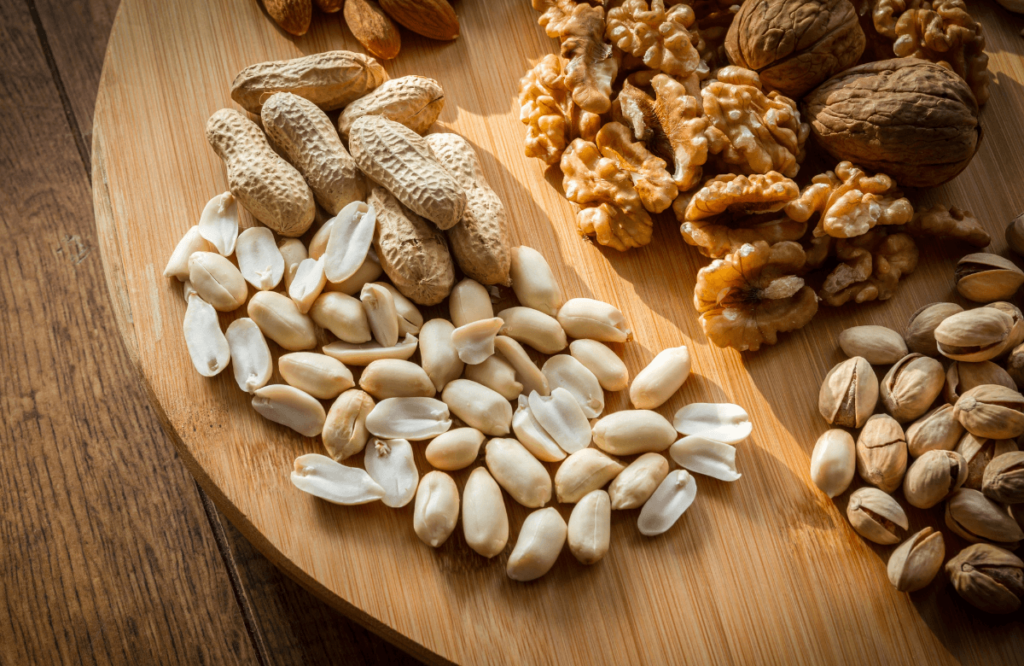
Tips for Eating Nuts
Incorporating more nuts into your diet is a smart and delicious way to boost your overall nutrition and enjoy the numerous health benefits they offer. If you want to eat more nuts, consider these tips to make it easier and more enjoyable:
Snack Smartly: Keep a variety of unsalted, raw, or dry-roasted nuts on hand for convenient snacking. Portion them into small containers or resealable bags to avoid overeating.
Add to Breakfast: Sprinkle chopped nuts like almonds, walnuts, or pecans over your morning oatmeal, yogurt, or cereal to add a crunchy texture and boost the nutritional value of your meal.
Mix into Salads: Toss a handful of nuts into your salads for extra flavor, texture, and nutrition. Nuts can complement both green salads and fruit salads.
Blend into Smoothies: Add a tablespoon of nut butter (such as almond butter or peanut butter) to your smoothies for a creamy consistency and a dose of healthy fats and protein.
Create Nut Butter Sandwiches: Swap traditional spreads like peanut butter or almond butter for your sandwiches to make them more nutritious and satisfying.
Make Trail Mix: Prepare your custom trail mix by combining your favorite nuts with dried fruits, seeds, and a sprinkle of dark chocolate chips for a delicious and energy-boosting snack.
Bake with Nuts: Incorporate nuts into your baked goods like cookies, muffins, and cakes to enhance the flavor and add nutritional value.
Stir into Stir-fries: Sprinkle some crushed or sliced nuts into your stir-fry dishes for an extra crunchy and nutritious element.
Nutty Desserts: Indulge in healthier desserts by incorporating nuts into recipes like nutty energy balls, granola bars, or nut-studded dark chocolate.
What’s a healthy serving of nuts?
A healthy serving of nuts typically amounts to about one ounce, which is equivalent to approximately 28 grams or a small handful. This portion size is a good balance between reaping the nutritional benefits of nuts and managing calorie intake. One ounce of nuts provides a substantial dose of healthy fats, protein, fiber, vitamins, and minerals, making it a satisfying and nutritious snack option.
However, it’s essential to be mindful of portion control since nuts are calorie-dense, meaning they pack a significant number of calories in a small volume. Including a daily serving of nuts as part of a balanced diet can contribute to better heart health, improved brain function, and overall well-being. Remember to choose raw or dry-roasted nuts without added salt or sugar to maximize their health advantages and enjoy their delicious flavors guilt-free.

How about nut oils? Are they healthy, too?
Nut oils, derived from various nuts such as almonds, walnuts, and macadamia nuts, can be a healthy addition to your diet when used in moderation and in their pure, unprocessed form. These oils are rich in monounsaturated and polyunsaturated fats, which are considered heart-healthy fats. The high content of these healthy fats can help improve cholesterol levels, reduce inflammation, and lower the risk of cardiovascular diseases.
In addition to healthy fats, nut oils also contain essential nutrients like vitamin E, an antioxidant that helps protect cells from damage caused by free radicals. This very well may aid in maintaining healthy skin and immune function.
However, it’s essential to remember that nut oils are calorie-dense, and excessive consumption can lead to weight gain. To enjoy the health benefits of nut oils, it’s crucial to use them in moderation and as part of a balanced diet. Drizzling nut oil over salads, using it for light sautéing, or incorporating it into homemade salad dressings can be a flavorful way to reap the advantages of these nutritious oils. Always opt for cold-pressed or unrefined nut oils, as the refining process can strip away some of their beneficial properties.
People with nut allergies should avoid nut oils, as they can trigger allergic reactions. Additionally, individuals watching their caloric intake or with specific health conditions should consult with a healthcare professional or registered dietitian before incorporating nut oils into their diet. Overall, when used wisely, nut oils can be a valuable and healthy addition to your culinary repertoire.












